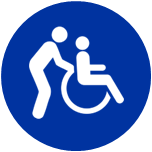How to Prepare for Discharge?Who is involved with discharge and what happens after you leave the hospital? |
|
 |
Physical & Occupational TherapiesEvaluation completed on admission for all stroke patients includes patient medical history, cognition evaluation, level of function, Strength and mobility testing, and ability to perform self-care activities. This determines need of further therapy at discharge. The therapist will provide the stroke physician team recommendations regarding discharge plan, such as home, rehab etc. They will also determine plan of care and skilled intervention plan for rehab therapy during hospital stay. During the initial evaluation, a plan of care and a skilled intervention plan for rehab therapy during hospital stay will be established. The patient will be seen for therapy approximately 2-5 times a week. As part of the discharge preparation, the patient will be evaluated for equipment needs at home, and be provided with driving rehab resources as needed. Discharge plans will be individualized based on patient needs. |
 |
Speech TherapyEvaluation completed on admission for all stroke patients includes patient medical history, cognition evaluation, communication skills, and swallowing impairment. This determines both the need for alternative means of nutrition as well as need of further therapy at discharge. The SLP department will provide Stroke physician team recommendations regarding discharge plan, such as home, rehab etc. They will also determine plan of care and skilled intervention plan for rehab therapy during hospital stay. During the initial evaluation, a plan of care and a skilled intervention plan for rehab therapy during hospital stay will be established. The patient will be seen for therapy approximately 2-5 times a week. The patient may also need to undergo more formal testing for swallowing difficulties. As part of the discharge preparation, the patient will be evaluated for needs at home, and be provided resources as needed. Discharge plans will be individualized based on patient needs. |
 |
Vocational TherapyVocational therapy, is a vital component in any stroke recovery program for stroke survivors or those who suffer any serious injury to the spine and head and a similar condition. Vocational therapy is different from occupational therapy in its focus. Occupational therapy is concerned with helping the patient regain the ability—the muscular control and coordinative skills—to perform the activities of daily living, which may involve personal tasks, such as bathing, and job-related tasks, such as talking on the telephone. Vocational rehabilitation, on the other hand, is more focused on helping the individual re-learn the more complex skills that they performed on the job before the stroke occurred or on learning new skills for a different job and looking for new job opportunities. As part of the discharge preparation, the patient will be evaluated for equipment needs at home, and be provided with driving rehab resources as needed. Discharge plans will be individualized based on patient needs. |
 |
Case ManagementIn acute care hospitals, the case manager is a social worker or registered nurse who works directly with you during your hospital stay. The hospital case manager will help you find the right level of care, support and services you need as you leave the hospital and continue your journey to recovery. As part of the discharge preparation, the patient will be evaluated for needs at home or rehab, and be provided with an individualized plan of care and treatment. Case Management will also help set goals and desired outcomes and help prepare you and your family for your return home and the community. |
Preparing for Discharge
